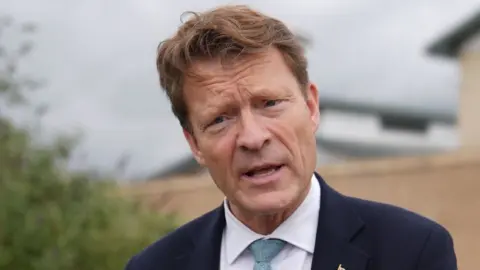Reform UK, a political party, has recently ignited a fervent debate in the Lincolnshire area by vocally opposing various green energy projects poised to contribute to the UK’s net-zero emissions target. Leaders of the party, most notably Boston and Skegness MP Richard Tice, Lincolnshire’s mayor Dame Andrea Jenkyns, and Councillor Sean Matthews, held a press conference in Boston to announce their disapproval of wind and solar farms, as well as battery storage facilities. Tice blatantly criticized the government’s net-zero objectives, referring to them as “madness” and indicating that these initiatives were detrimental to both the county and the broader national landscape.
The context of their campaign emanates from broader concerns regarding energy security in the UK. The government maintains that a commitment to green energy is crucial for reinforcing energy independence. In contrast, Labour MP Melanie Onn argued that the stance taken by Reform UK could jeopardize numerous jobs within the green energy sector. Currently, the industry employs approximately 12,500 people in Greater Lincolnshire alone.
Numerous projects labeled as “nationally significant infrastructure projects” are on the horizon for Lincolnshire, such as expansive solar farms and an intricate network of pylons stretching from Grimsby to Walpole in Norfolk. However, the ultimate decision on these proposals lies with government ministers rather than local councils, showcasing a disconnect between local stakeholders and national policy-makers.
To combat the planned developments, Tice and his associates launched the LORE campaign (Lincolnshire Opposes Renewable Eyesores), promising to exhaust every possible avenue to halt these renewable projects. Tice contended that the costs associated with electrification were directly tied to the government’s net-zero agenda. In response, the government attributed the rise in energy bills to the nation’s dependency on unstable gas markets, frequently manipulated by geopolitical circumstances and actors.
Dame Andrea Jenkyns drew historical comparisons during the conference, likening the fight against green energy projects to the valor exhibited by Bomber Command in World War II, based in Lincolnshire. She passionately expressed her desire to “unleash the spirit of Lincolnshire” in opposition to what she termed “the planned desecration of our countryside.” She pointedly questioned why any government would jeopardize the nation’s food security by endorsing expansive solar farms instead of focusing on the region’s agricultural significance.
The government has specified that solar farms should ideally be positioned on brownfield sites or lower-grade agricultural terrain, assuring constituents that these projects would only occupy a maximum of 0.4% of the UK land by 2030, even in the most ambitious scenarios. Nevertheless, Jenkyns countered these claims, labeling the concept of net-zero as a “con” and arguing that reliance on oil and gas should remain at the forefront of the UK’s energy strategy. Echoing sentiments reminiscent of former US President Donald Trump’s campaign, she declared that should Reform UK come to power in 2029, the phrase “drill baby drill” would become their rallying cry.
The conflict surrounding these energy initiatives raises significant concerns about local employment and economic growth. Onn highlighted the potential fallout from Reform UK’s opposition, which could endanger thousands of jobs. A representative from the government’s Department for Energy Security elaborated that the ongoing increases in energy costs stem from vulnerability to global gas market fluctuations and underlined that transitioning to renewable energy, alongside upgrading the electricity grid, is essential for establishing a self-sufficient energy future.
As tensions escalate, Lincolnshire’s landscape becomes a battleground for differing visions of the future, with the conflict between sustainable energy development and regional economic interests at its core. The ongoing debate signifies a critical juncture in how the UK navigates its commitment to environmental responsibilities while addressing local concerns about jobs and energy independence.











